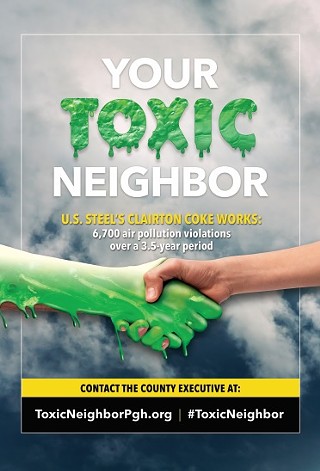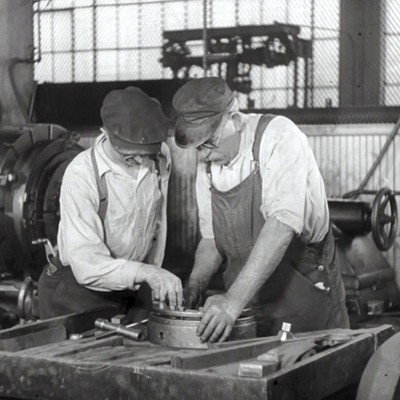Monday, November 6, 2017
Allegheny County residents ask Board of Health to address their “toxic neighbor,” Clairton Coke Works
Allegheny County’s poor air quality is no secret. In April, environmental advocacy organization PennEnvironment released a report saying Pittsburgh was the sootiest city on the East Coast. The city also ranked third in the northeast for the highest number of days with elevated smog pollution.
And according to environmental activists, U.S. Steel’s Clairton Coke Works is one of the biggest offenders. The Clairton plant, which is the largest coke-works facility in the country, has committed 6,700 air pollution violations over a three-and-a-half-year period between 2012 and 2015. And now the plant is the target of PennFuture’s “Toxic Neighbor” campaign, which seeks to bring awareness to how polluters affect the people living under their clouds of toxins.
Fourteen people spoke about the issue at the Allegheny County Board of Health meeting on Wed., Nov. 1. Brought together by PennFuture’s campaign, health professionals, environmental activists and concerned residents took to the podium to share their concerns about the plant's numerous air-pollution violations and to ask the board to hold the facility accountable.
“As assurance this record of disaster is coming to an end, in part, we ask the Health Department for an agenda item in an upcoming meeting, so it may present information on where U.S. Steel stands in complying with the consent judgement, and complying with the law in general,” said Jacquelyn Bonomo, president and CEO of PennFuture.
“There is no justification for ACHD to allow this one company to continue to pollute the lungs of its neighbors,” Bonomo said.
Pediatrician Ned Ketyer attested to the fact that Pittsburgh has an asthma problem related to its poor air quality. He said that 22 percent of Pittsburgh school children have asthma, which is nearly three times the national rate.
“On days when the air quality is not good in Allegheny County, those are bad days for children and adults with asthma,” Ketyer said.
Morningside resident Lisa Minetti is a native Pittsburgher who moved back to the area 15 months ago. Ever since, she has been dealing with splitting headaches and asthma attacks — health problems she didn’t have when she lived away from Pittsburgh. Her first day back was fine, she recalls, but the second morning was a poor-air-quality day, and an asthma attack woke her up.
“The stench was what struck me the most: I knew that smell. That smell was Greenfield before the Hazelwood coke plant closed. That smell was the North Side before Shenango closed,” Minetti said. “It angers me that [the smell] is still here.”
Again and again, as each speaker took the podium, they voiced their concerns about the pollution’s effects on the public, especially on vulnerable populations like children, the elderly, and those living in poor communities.
“Today in Allegheny County, we have an air-pollution problem, a cancer and an asthma problem, and an ecological plastics problem, and an existential climate crisis. We have solutions to these problems— solutions that should not exclude the neighborhoods and people of Clairton, Braddock, Monaca, and all parts unknown,” Ketyer said.
The board didn’t comment on the public testimony during the meeting.
William Youngblood, the vice chair of the Board of Health, sent Pittsburgh City Paper the following response:
“The Board of Health appreciates the input of Allegheny County residents. While we have made progress in our air quality, there is work to do, and we are committed to improving our air quality beyond current EPA standards throughout the county. The Allegheny County Health Department is dedicated to holding polluters accountable and enforcing regulations to the extent possible. We also recognize that enforcement alone will not achieve our goals, and we call upon industry leaders to do what is needed to accelerate change.”
And according to environmental activists, U.S. Steel’s Clairton Coke Works is one of the biggest offenders. The Clairton plant, which is the largest coke-works facility in the country, has committed 6,700 air pollution violations over a three-and-a-half-year period between 2012 and 2015. And now the plant is the target of PennFuture’s “Toxic Neighbor” campaign, which seeks to bring awareness to how polluters affect the people living under their clouds of toxins.
Fourteen people spoke about the issue at the Allegheny County Board of Health meeting on Wed., Nov. 1. Brought together by PennFuture’s campaign, health professionals, environmental activists and concerned residents took to the podium to share their concerns about the plant's numerous air-pollution violations and to ask the board to hold the facility accountable.
“As assurance this record of disaster is coming to an end, in part, we ask the Health Department for an agenda item in an upcoming meeting, so it may present information on where U.S. Steel stands in complying with the consent judgement, and complying with the law in general,” said Jacquelyn Bonomo, president and CEO of PennFuture.
“There is no justification for ACHD to allow this one company to continue to pollute the lungs of its neighbors,” Bonomo said.
Pediatrician Ned Ketyer attested to the fact that Pittsburgh has an asthma problem related to its poor air quality. He said that 22 percent of Pittsburgh school children have asthma, which is nearly three times the national rate.
“On days when the air quality is not good in Allegheny County, those are bad days for children and adults with asthma,” Ketyer said.
Morningside resident Lisa Minetti is a native Pittsburgher who moved back to the area 15 months ago. Ever since, she has been dealing with splitting headaches and asthma attacks — health problems she didn’t have when she lived away from Pittsburgh. Her first day back was fine, she recalls, but the second morning was a poor-air-quality day, and an asthma attack woke her up.
“The stench was what struck me the most: I knew that smell. That smell was Greenfield before the Hazelwood coke plant closed. That smell was the North Side before Shenango closed,” Minetti said. “It angers me that [the smell] is still here.”
Again and again, as each speaker took the podium, they voiced their concerns about the pollution’s effects on the public, especially on vulnerable populations like children, the elderly, and those living in poor communities.
“Today in Allegheny County, we have an air-pollution problem, a cancer and an asthma problem, and an ecological plastics problem, and an existential climate crisis. We have solutions to these problems— solutions that should not exclude the neighborhoods and people of Clairton, Braddock, Monaca, and all parts unknown,” Ketyer said.
The board didn’t comment on the public testimony during the meeting.
William Youngblood, the vice chair of the Board of Health, sent Pittsburgh City Paper the following response:
“The Board of Health appreciates the input of Allegheny County residents. While we have made progress in our air quality, there is work to do, and we are committed to improving our air quality beyond current EPA standards throughout the county. The Allegheny County Health Department is dedicated to holding polluters accountable and enforcing regulations to the extent possible. We also recognize that enforcement alone will not achieve our goals, and we call upon industry leaders to do what is needed to accelerate change.”
Tags: Clairton Coke Works , U.S. Steel , Allegheny County , Board of Health , William Youngblood , PennEnvironment , PennFuture , Braddock , Monaca , EPA , pollution , environment , Ned Ketyer , Jacquelyn Bonomo , Lisa Minetti , Image
















